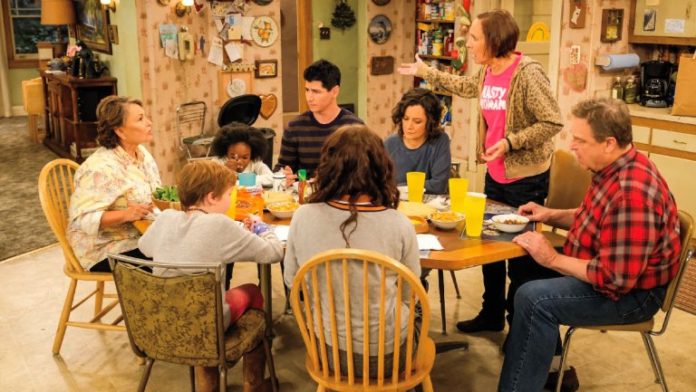
More than 20 years after wrapping its nine-season run on ABC, Roseanne‘s working-class Conner family returned to ABC with a politically themed series premiere that also set the stage for what’s to come from the nine-episode revival.
Showrunner Bruce Helford, who ran one season of the original series starring Roseanne Barr as the married and harried mother of three, tells The Hollywood Reporter that the series quickly and intentionally tackled its star’s support of President Donald Trump out of a desire to discuss the country’s political divide. Doing so, Helford says, immediately addressed the elephant in the room while it also helped to pave the ways in which politics trigger bigger issues within the show’s central family.
Below, Helford talks with THR about how emotional the season is, why he hopes viewers will judge the series based on their experience (and not what they read) and his desire to get the gang back together on ABC as a yearly event.

When did you get the call to come back?
I was leaving New York after doing CBS’ Kevin Can Wait and coming back to L.A. when I got a call from [executive producer] Tom Werner asking if I’d be interested in doing Roseanne again. We talked about it and then I met with Rosie. We spent hours talking about the old days and what we each wanted to do.
What were some of the subjects that came up in that conversation?
She wanted to deal with health care in America. She had a knee problem — it’s better now — that spurred the whole thing. She said, “What would Roseanne Conner do?” She couldn’t afford the deductible to have surgery, so where does she turn to be able to get through work and everything else? She wanted young grandchildren that her character could dote on, spoil and ruin because she has grandchildren. When she first hired me in the fifth season, she said, “I want you to be brave.” It turned out to be a brave season and the same applied here. She wanted me to go to the edge and I wanted her to do that, too. We don’t agree on lots of stuff, but we do agree on lots of stuff! (Laughs.) The show reflects Roseanne’s views. She is way out there [on some topics] and people aren’t going to agree with some things. But when push comes to shove on important issues, when Roseanne believes in someone, she’ll back then up.
How did you navigate balancing the show so that it wasn’t all Barr’s political point of view?
I’m really happy with the balance in the show. Roseanne said that [the revival] “can’t be my bully pulpit, it has to be everybody.” [Meaning that] Darlene [Sara Gilbert] and Jackie [Laurie Metcalf] would certainly agree with Roseanne on a lot of stuff, too.
Is that the genesis for the first episode as you get into Barr’s personal politics?
Yes. We thought there was no way that Roseanne, Jackie and Darlene would have all voted for the same person. Which is why when the show started, they haven’t spoken for a year and a half because they’ve been fighting. That all comes up again when Darlene comes home and brings Jackie over. That was our way of discussing the political divide, which is tough territory — but there are lots of homes in America going through that.
Was taking on Trump and having the show’s central character back him an easy decision for you?
Yes. I love the debate. The world has become very politically correct. Some things for good, some things not for good, as far as I’m concerned. As a writer, I’m never going to support being too politically correct because I want to be able to get the conversation going. We knew that we were going to be challenging ourselves. We’re tackling some stuff that most comedies wouldn’t go anywhere near but we have a legacy to be that show and I think we’re allowed.

That dialogue is a big part of why the show is back. ABC Entertainment president Channing Dungey said last year that a lot of networks don’t do a great job of appealing to the working class/Trump’s America —
That’s one of the reasons. There are a couple of exceptions to that — like Showtime’s Shameless and SMILF. But when it comes to how the working class is depicted on TV, [a lot of shows have] generally been people making fun of them. I grew up in a working-class family from Chicago and my folks would put me on the phone to tell the people from the electric company…










